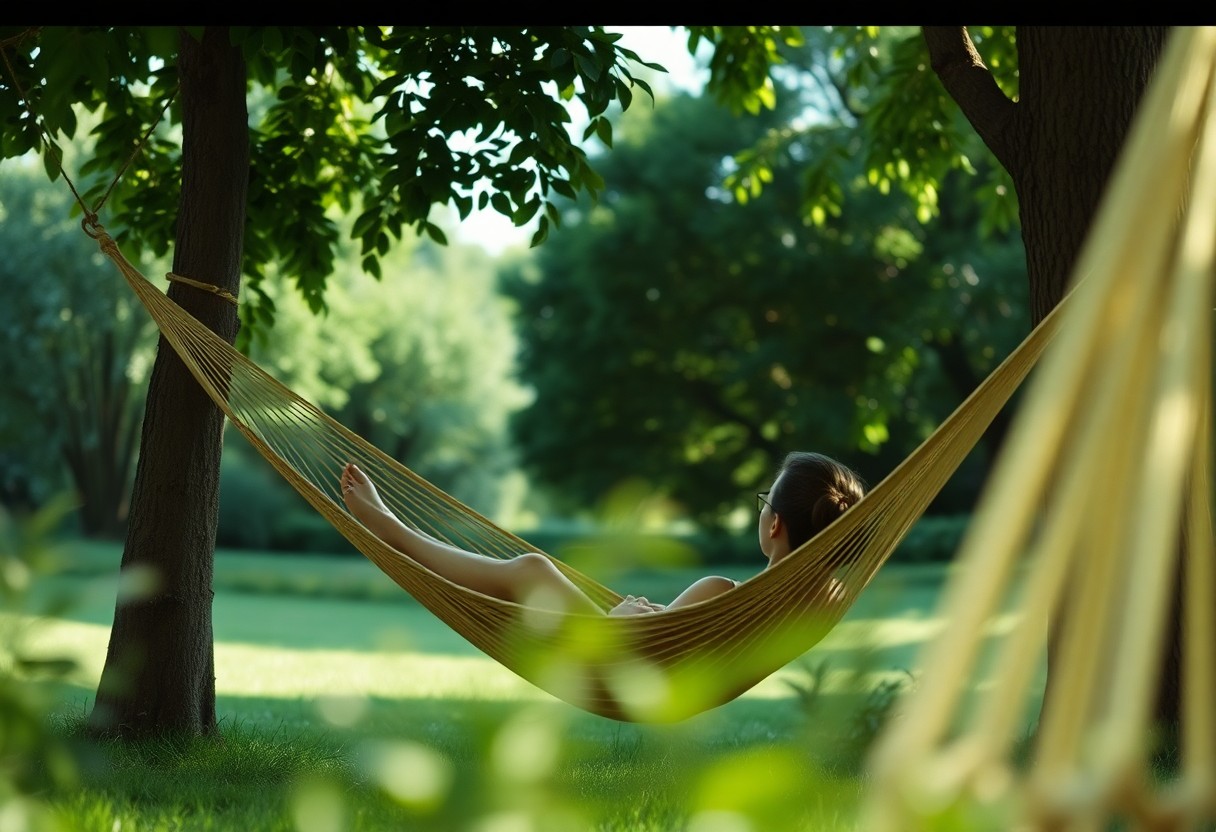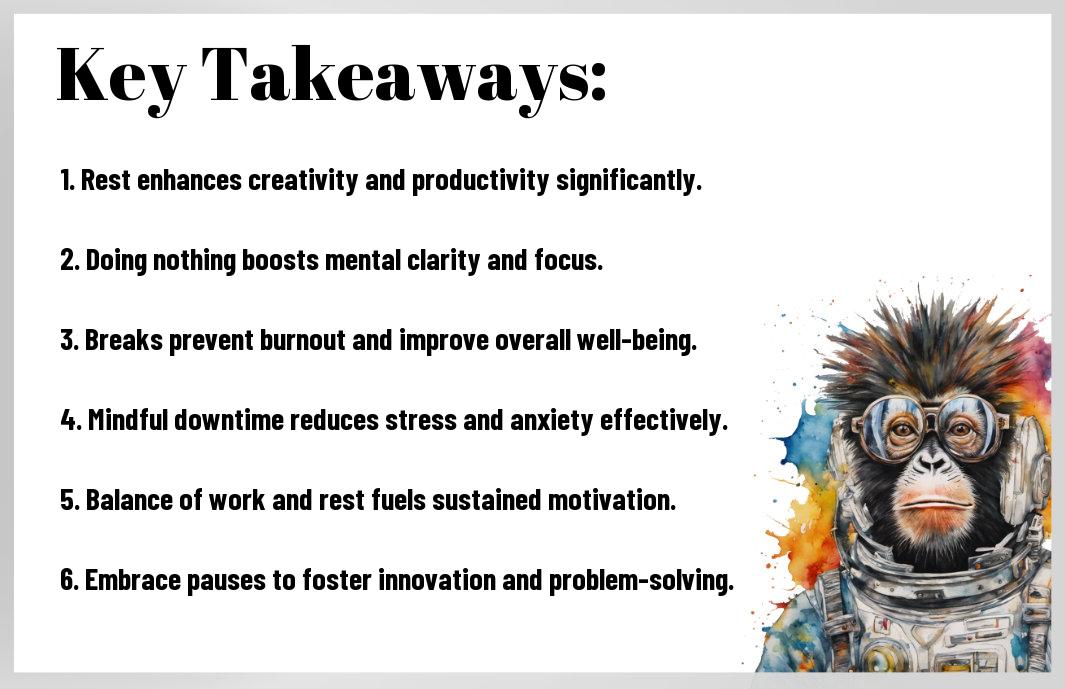Mindfulness plays a vital role in understanding the importance of stepping back from your daily hustle. In a fast-paced world, the art of doing nothing may feel counterintuitive, yet it is imperative for rejuvenating your mind and enhancing your overall productivity. This blog post will explore the benefits of intentional downtime, the dangers of constant busyness, and practical tips for incorporating moments of stillness into your routine. Embracing the art of doing nothing can lead to greater creativity and a healthier, more balanced lifestyle that positively impacts your overall well-being.

Key Takeaways:
- Embracing downtime can enhance creativity and productivity, allowing for better problem-solving and innovative thinking.
- Practicing the art of doing nothing helps reduce stress and improve overall well-being, promoting a healthier work-life balance.
- Intentional breaks and moments of inactivity can lead to greater focus and effectiveness when returning to tasks and responsibilities.
Understanding the Concept of Doing Nothing
While it may seem counterintuitive, the concept of doing nothing plays a significant role in maintaining your overall well-being. It allows your mind to rest, encourages creativity, and fosters deeper self-awareness. Embracing the art of doing nothing can empower you to recharge your mental battery, offering room for reflection and clarity in an often chaotic world.
Defining ‘Doing Nothing’
Among various interpretations, ‘doing nothing’ signifies a state of intentional disengagement from tasks and distractions. It involves letting go of the hustle, taking a pause, and providing yourself with the opportunity to simply exist without obligations. This state can be restorative, allowing your psyche the space it needs to revitalize.
Historical Perspectives
Doing nothing has been viewed through various lenses throughout history, often reflecting cultural attitudes towards productivity and leisure. In ancient philosophy, particularly with Stoics and Epicureans, moments of inactivity were considered vital for contemplation, leading to deeper insights into life. Conversely, the rise of the industrial age positioned work as a measure of value, marking idle time as unproductive.
For instance, the Greeks emphasized a balance between work and leisure, viewing ‘scholē’ (leisure) as vital for personal growth. This notion was contrasted by the Puritan work ethic that bourgeois society adopted, which relegated doing nothing to a guilt-ridden exercise. Recognizing these historical perspectives not only highlights how societal values have evolved but also your opportunity to reclaim and respect your right to pause amidst your busy life.

The Psychological Benefits
Any effort to embrace the art of doing nothing can profoundly affect your mental well-being. Taking a deliberate pause helps you detach from the chaos of daily life, allowing your mind to rest, recharge, and ultimately foster a healthier psychological state. This practice of slowing down encourages self-reflection and promotes emotional growth, paving the way for overall happiness and balance in your life.
Reducing Stress and Anxiety
Around you, the pressures of daily life can accumulate, resulting in heightened stress and anxiety. By integrating moments of stillness into your routine, you create space for relaxation, enabling your mind to reset. This intentional downtime not only diminishes immediate feelings of stress, but also contributes to long-term resilience against anxiety, allowing you to approach challenges with a clearer mind.
Enhancing Creativity and Productivity
Productivity often suffers when you feel overwhelmed, leading to a cycle of frustration. Engaging in periods of doing nothing helps to break this cycle. Instead of pushing through mental fatigue, these moments of calm allow your subconscious to process information and generate fresh ideas. By stepping back, you unlock your creativity, and ultimately enhance your productivity when you return to your tasks.
Stress and fatigue can cloud your thinking and stifle creativity, making it difficult to produce your best work. Regularly practicing moments of intentional stillness allows your mind to regroup and encourages new perspectives to emerge. As you embrace this valuable time, you’ll find that your ability to connect ideas and problem-solve improves. Ultimately, this practice elevates both your creative output and productivity, enriching your personal and professional life in significant ways.
The Societal Implications
Now, as you explore into the complexities of idleness, it’s vital to recognize the broader societal implications of promoting a culture that values doing nothing. Your perspective on leisure and relaxation can influence workplace dynamics, productivity levels, and overall societal well-being. As modern life continues to accelerate, fostering an appreciation for downtime becomes vital in combating stress and enhancing community connections.
Cultural Attitudes Towards Idleness
Idleness often carries negative connotations in many cultures, where busyness is equated with productivity and worth. You might find that this pervasive attitude discourages moments of rest and encourages a never-ending cycle of work. Understanding these cultural perceptions can help you navigate your own relationship with idleness and challenge the stigma that surrounds it.
The Work-Life Balance Debate
After exploring the value of doing nothing, you may engage with the ongoing debate surrounding work-life balance. Striving for equilibrium between personal life and professional obligations can sometimes feel like an impossible task. This conflict becomes increasingly important as you confront the consequences of a society that often glorifies overwork while underestimating the benefits of leisure time.
Implications of this debate can significantly affect your mental health and overall happiness. When you prioritize work at the expense of your personal time, you risk experiencing burnout and decreased productivity. On the positive side, embracing a healthier work-life balance can lead to enhanced creativity and better relationships. By engaging in restorative activities, you cultivate a more fulfilled and productive life, ultimately supporting your overall well-being in a demanding world.
Practical Strategies for Embracing Idleness
After recognizing the importance of idleness, embracing it in your daily life can be transformative. Start by allocating intentional time for doing nothing. Designate specific periods in your day for leisurely activities that allow your mind to rest, such as watching the clouds drift or listening to music without distraction. By consciously scheduling these moments, you create a safe space for creativity and relaxation to flourish.
Mindfulness and Meditation Techniques
The practice of mindfulness and meditation can significantly enhance your ability to embrace idleness. By honing your focus on the present moment, you can cultivate a deeper appreciation for the stillness around you. Simple techniques such as deep breathing, body scanning, and watching your thoughts flow can help quiet your mind and invite a sense of peace. Integrate these practices into your routine to experience the profound benefits of relaxed presence.
Incorporating Breaks into Daily Routines
Meditation is one effective way to infuse breaks into your daily activities. Short pauses throughout your day foster a sense of calm and help you disengage from the constant pressures of work. You might start by setting a timer for 5-10 minutes every hour, using that time to step away from screens and cultivate a mindful practice. It’s important to prioritize these breaks, as they can prevent burnout and rejuvenate your energy levels, enhancing your productivity in the long run.
It’s vital to understand that taking breaks isn’t just beneficial; it’s necessary for your well-being. Infusing structured breaks into your daily routine can help clear mental clutter and improve your focus when you return to tasks. Incorporating simple activities, such as stretching, enjoying a cup of tea, or simply staring out the window, can enhance your capacity for effective work. The key is to approach these breaks without guilt and view them as vital moments for replenishing your energy, ultimately allowing you to perform at your best.
Overcoming Guilt Associated with Downtime
Many individuals grapple with feelings of guilt when they take time off to recharge. This misconception often stems from a societal pressure to be constantly productive, leaving you feeling undeserving of break time. The key to overcoming this guilt lies in recognizing that downtime is not just about being unproductive; it’s a vital component of your overall well-being and performance. When you allow yourself to pause, you empower your mind and body to rejuvenate, ultimately enhancing your productivity in the long run.
Reframing Perceptions of Productivity
Downtime should be viewed as a necessary investment in your mental and physical health rather than a loss of productivity. Acknowledging that breaks enhance your creativity, focus, and efficiency can help shift your mindset. Instead of measuring success by hours spent working, consider the quality of the work produced. Embracing this perspective enables you to appreciate the value of rest and its significant contributions to your overall performance.
Embracing Leisure as Essential
To redefine your approach to leisure, it is crucial to accept it as a vital part of a balanced life. Engaging in activities that bring you joy and relaxation is not merely indulgent; it contributes to your long-term success and happiness. You deserve time for hobbies, family, and self-care, knowing that these moments of enjoyment fuel your motivation and creativity, paving the path for greater achievements.
Hence, embracing leisure as crucial elevates your overall quality of life. Engaging in activities you love creates a positive feedback loop, boosting your mental health and allowing you to return to work rejuvenated. Avoid the trap of guilt associated with leisure time; instead, recognize that it leads to better focus and increased productivity. By prioritizing leisure, you’re not just making time for enjoyment, but ensuring sustainable success in your professional and personal endeavors. Embrace this balance, and you will see its transformative effects on your life.
The Future of Work and Idleness
Your experience at work is evolving, and with it, the acceptance of idleness as a vital component of productivity. The future of work is beginning to embrace periods of rest and reflection, recognizing that they can lead to enhanced creativity and improved mental well-being. As workplaces shift towards more flexible models, prioritizing downtime could transform the way you approach your tasks and ultimately lead to a healthier work-life balance.
Evolving Workplace Policies
Workplace policies are adapting to emphasize the importance of downtime in maintaining employees’ mental health and creativity. Companies are exploring new guidelines that advocate for regular breaks, encouraging you to integrate short periods of rest into your workday. By fostering an environment where taking time off is a norm, organizations can boost morale, enhance teamwork, and ultimately drive productivity.
The Role of Technology in Facilitating Downtime
Before diving deeper into the need for idleness, consider technology’s role in promoting moments of reflection. It enables you to manage work tasks more efficiently which frees up time for *personal breaks*. With the emergence of apps designed for mindfulness and relaxation, achieving balance has become more accessible than ever.
Plus, technology can facilitate downtime by integrating tools that remind you to pause and recharge. Innovative platforms help you schedule breaks or suggest quick activities like *deep breathing exercises* and *meditation sessions*, resulting in less stress and improved focus. However, it’s vital to establish boundaries; otherwise, you might find *your digital devices* unintentionally keeping you busy during well-deserved breaks. Embrace the benefits of technology while staying cognizant of maintaining intentional downtime to reap the maximum benefits of your work experience.
Summing up
Ultimately, embracing the art of doing nothing can enhance your overall well-being and productivity. By allowing yourself moments of stillness, you can recharge your mental and emotional batteries, leading to greater creativity and focus in your daily tasks. This intentional pause not only contributes to your personal growth but also fosters a more balanced life. Integrating breaks into your routine isn’t just beneficial; it’s necessary for sustained success and fulfillment. Prioritize these moments, and you’ll likely see a positive shift in your approach to work and life.
FAQ
Q: What is the main idea behind ‘WorkWell – The Art of Doing Nothing’?
A: ‘WorkWell – The Art of Doing Nothing’ emphasizes the importance of taking intentional breaks and allowing ourselves to rest. The book argues that doing nothing is not merely a waste of time but a vital part of productivity and creativity. It highlights how moments of pause can lead to mental clarity, innovation, and better decision-making, encouraging readers to integrate downtime into their daily routines for enhanced overall well-being.
Q: How does ‘WorkWell’ address the stigma around idleness in modern society?
A: The book challenges the societal notion that constant busyness equates to worth or success. It presents research and examples that showcase the benefits of idleness, including improved focus and increased resilience. By promoting the idea that taking time to relax and recharge can significantly improve performance, ‘WorkWell’ aims to shift the perspective towards a more balanced understanding of productivity.
Q: Are there practical strategies provided in ‘WorkWell’ for incorporating downtime into a busy schedule?
A: Yes, ‘WorkWell’ offers various practical strategies for integrating downtime into daily life. The book suggests techniques such as scheduling regular breaks throughout the day, establishing screen-free times, and engaging in mindfulness practices. It provides actionable steps to help readers prioritize their well-being by embracing moments of stillness, thus enhancing their overall productivity and satisfaction in both personal and professional realms.

Leave a Reply